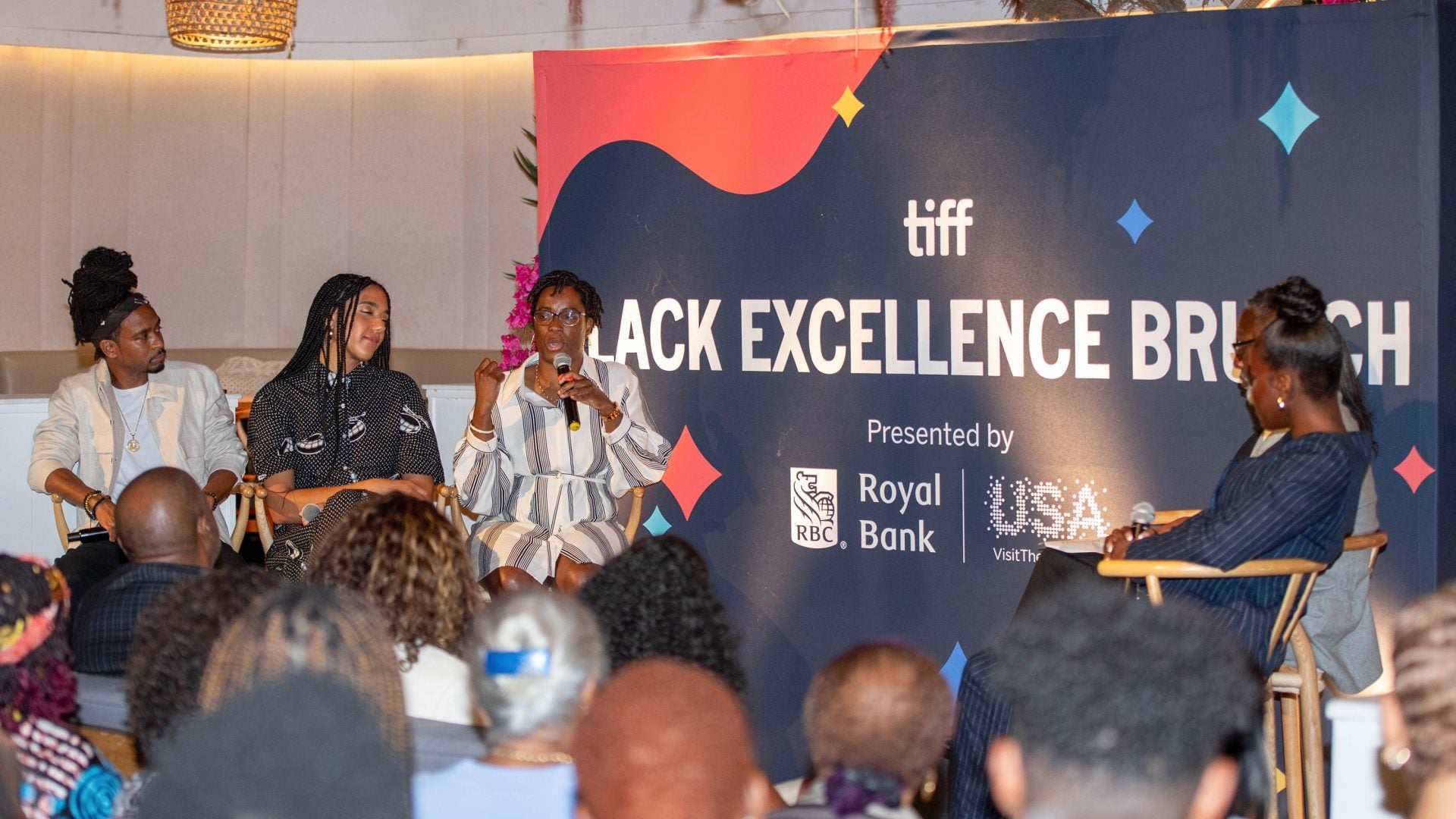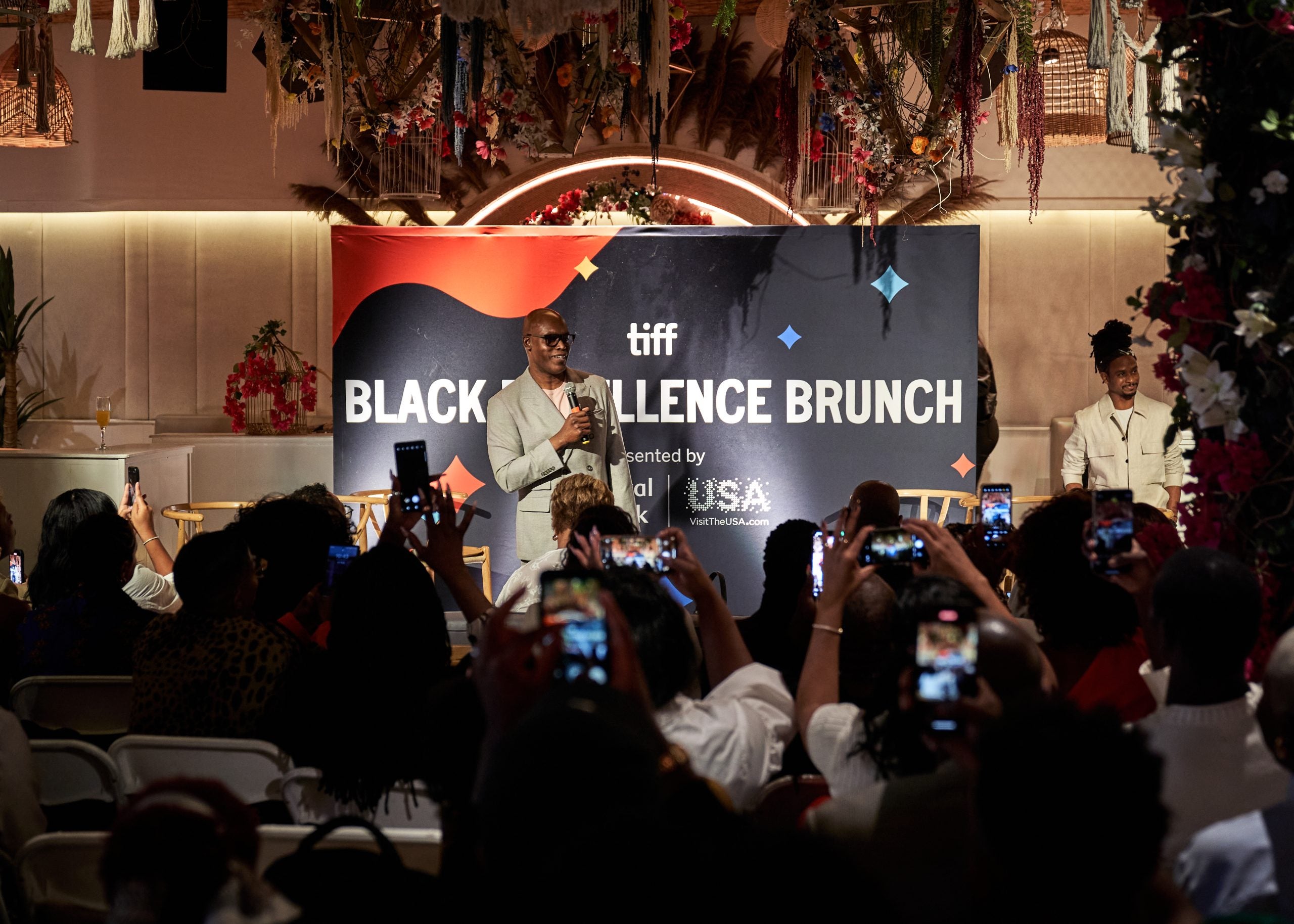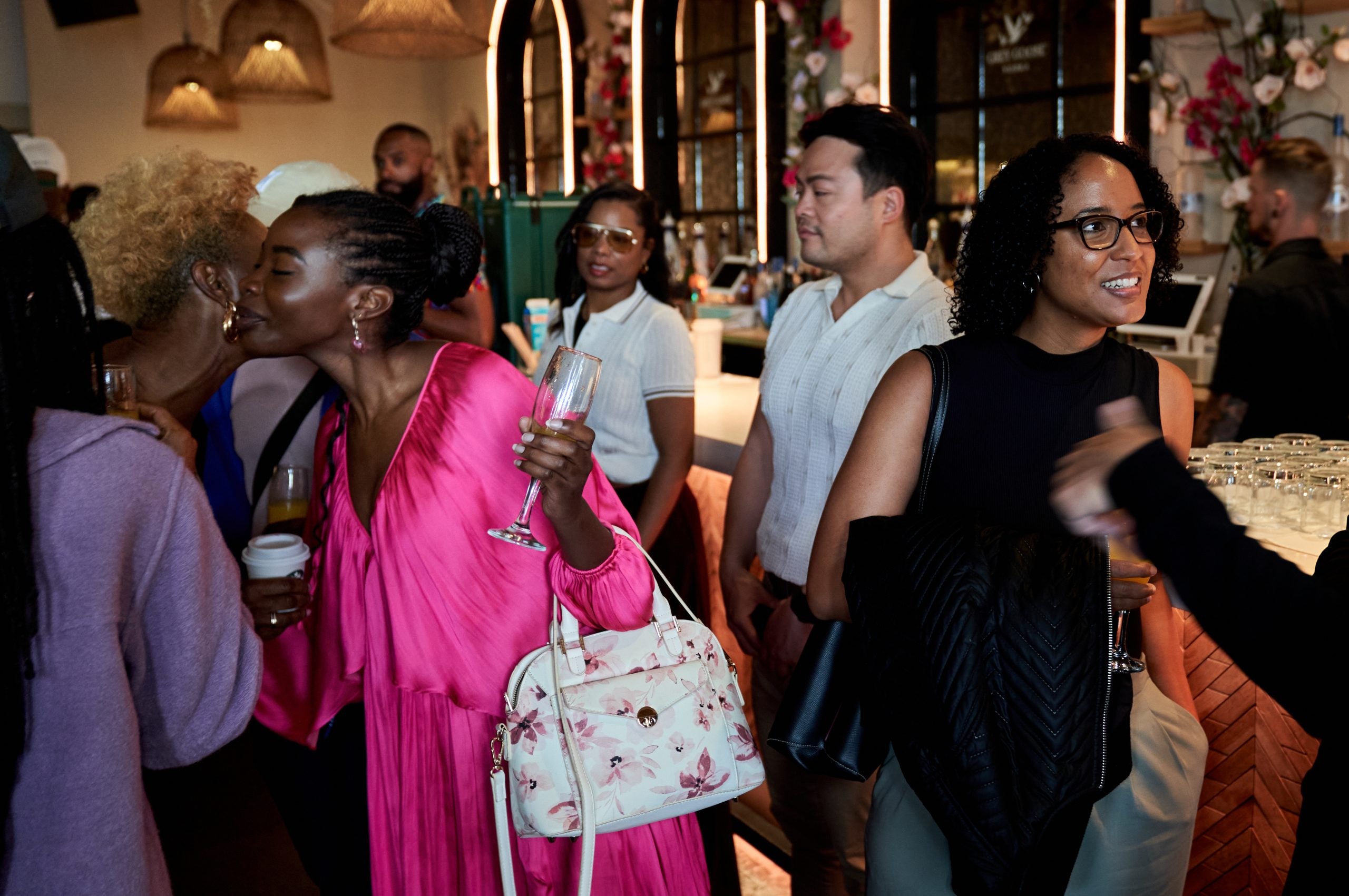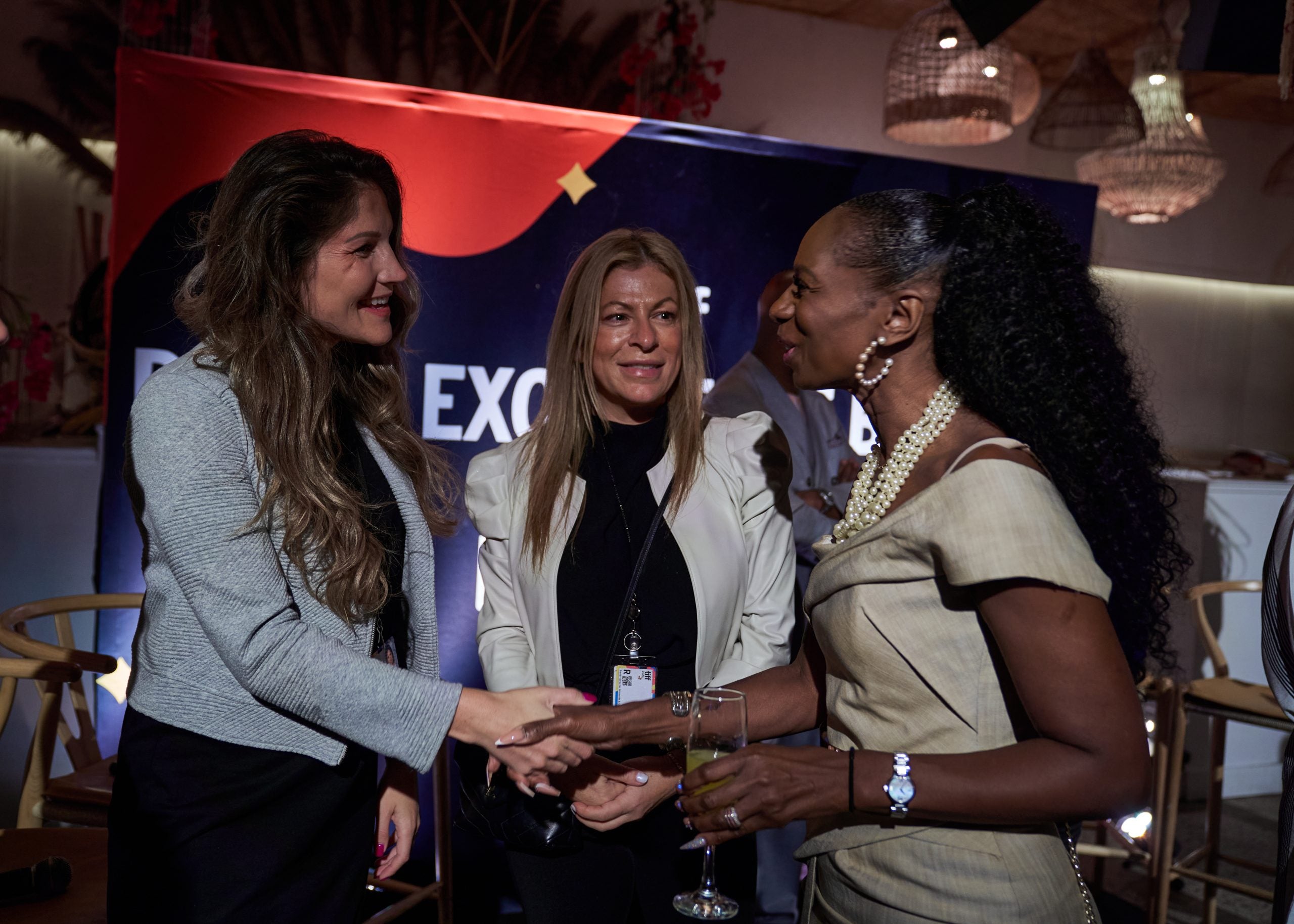
What better way to start a Monday than with Black excellence?
The stylish and airy Soluna restaurant in downtown Toronto was the home of the second annual TIFF Black Excellence Brunch, hosted by the Toronto International Film Festival (TIFF) on September 9 in partnership with Royal Bank of Canada (RBC) and Brand USA. With the theme “The Rise of the Multi-Hyphenate”, the brunch celebrated Black creatives who wear multiple hats in their careers. Whether writing, directing, producing, curating, or funding, this event highlighted the work of multitasking artists – ones who know that the full “Jack of all trades, master of none” quote ends with “But oftentimes better than a master of one.”
Guests entered the bohemian space, welcomed by servers offering mimosas, coffee, matcha balls, and yogurt parfait. The only thing more beautiful than the venue was the people – Black beauty of all kinds was on display with notable faces like Ryan Destiny, star of The Fire Inside premiering at TIFF, and Emmy-nominated actress Tonya Williams in attendance.
The event kicked off with opening remarks from Marsha John-Greenwood, VP of People and Culture at TIFF, Cameron Bailey, CEO of TIFF, Mark Beckles, VP of Social Impact and Innovation at RBC, and Don Richardson, Chief Financial, Diversity and Inclusion Officer at Brand USA. Their remarks touched on themes of amplifying Black voices and artistry and the importance of diasporic connections, with equal parts sincerity and humour. “I want to make sure that behind the screen and in front of the screen, we’re showcasing our talent – because it’s generational change,” shared Richardson.

“What we’re talking about today is what is now being called a ‘multi-hyphenate’ – our parents called it ‘just working’,” joked Bailey. “We’re all about the people who are writing, producing, performing, starting companies, start-ups, selling, buying…all of the things that we know are ‘Black jobs’ so we can make sure that we are running things.”
Following the opening remarks, Bailey introduced Joy Loewen, VP of Growth and Inclusion at the Canadian Media Fund, who moderated the event’s featured panel. Panelists included Zahra Bentham, actor and producer; Steve Harris, producer/writer/director/entrepreneur; Margaret Lewis, Senior Relationship Manager in Commercial Banking at RBC and producer; Carmen Thompson; film programmer and curator; and R.T. Thorne, director/screenwriter/producer (his debut feature film, 40 Acres, stars Danielle Deadwyler and premiered at TIFF last week).
For the next hour, attendees were enraptured by the gems these multi-hyphenates dropped, led by masterful moderation from Loewen. Though the panelists have unique backgrounds and focus in their work, there were common experiences and sentiments shared among them – notably around the importance of community, necessity as motivation, and feeling the fear but doing it anyway.

Thorne spoke on the impact of networking early in his career, and the fact that community remains crucial to his success. “You’re building an economy when you build a business of creativity,” he shared. Thorne detailed how connecting and growing with peers creates money-making opportunities which in turn allows creatives to support each other laterally, instead of waiting for funding to come from the top-down.
Lewis’ career in finance has shaped her work as a burgeoning producer, and she built on Thorne’s comments on community and economy. “So many people I encounter in my work at RBC don’t look like many of us in this room,” she expressed. “We need to find ways to remove the white middle man and get funding and opportunities more directly.” As a participant in Tonya Williams’ Reelworld Producer Program, Lewis saluted the Young and the Restless icon in the front row and noted the influence of other Black multi-hyphenates that have come before her.
Harris touched on the access and autonomy that Black creatives have today. “With your phones, you have a device right in your hands to create and distribute with,” he shared. Harris spoke on the importance of authenticity in building a following, and how that same authenticity can help Black creatives determine their brand. He reminded attendees to avoid chasing “the quick dopamine hit” and instead focus on steady growth, embracing the mistakes along the way. “Not everything works,” he stated. “Part of it not working is working.”
Bentham echoed Harris’ sentiments of not being afraid to try. She developed her production company alongside her business partner out of the necessity of wanting to create opportunities she didn’t see – and it’s been a learning process along the way. “Half the time I don’t know what I’m doing,” she admitted. “I’m just trying it, falling forward, believing in myself and betting on myself.”
Thompson, who is based in Scotland, also spoke on necessity. Born in Kenya, Thompson moved to the UK at 13 and quickly realized how critical media was in shaping perceptions and narratives, whether or not they were based in truth. That awakened an “innate thing in me of bringing forth more stories that reflect my life,” she shared, and her journey into programming and curation began. Thompson noted one of the significant accomplishments of We Are Parable, the organisation she works for – leading the release of Black Panther at the BFI IMAX theater, the largest theater screen in the UK. Community was reflected in that event, with We Are Parable ensuring that music, small businesses, and more were included to add to the experience of the film.
A thought-provoking question from a Black makeup artist during the Q&A prompted discussion about increasing the number of Black hair stylists and makeup artists in the industry. Joan Jenkinson, Executive Director of the Black Screen Office (BSO), shared that a new initiative between BSO and Front Street Pictures called Elevating Diversity Hair Program opens up opportunities for stylists specializing in textured and Black hair to work on film sets. Another question came from the Q&A about mentorship programs, and immediately prompted the passing of business cards with promises of further conversation. Community and connection were reflected throughout the entire panel discussion, and the panelists exited the stage to rousing applause.
After the panel, Tonya Williams took to the stage to announce the winner of the inaugural Black Excellence Brunch Honoree, R.T. Thorne. Thorne was recognized for the impact he has made in film and television with his groundbreaking work. This includes The Porter, a series co-produced by Canadian Broadcasting Corporation (CBC) and BET which nabbed 12 Canadian Screen Awards at the 2023 ceremony. A stunned Thorne returned to the stage to a standing ovation, expressing his gratitude for the recognition and encouraging us all to continue in our creative journeys.

With the official business out of the way, it was time to double down on community and connection. Brunch was served and attendees greeted each other over plates of poached eggs, croissants, smoked salmon, and more. On Soluna’s rooftop, the networking lounge was open for those who sought more information from industry insiders in casting, production, distribution, and funding. Keen guests took turns chatting with executives in these areas, gaining important information and key contacts.
As Black women do, the genuine “OK, dress!” and “I love your hair!” compliments flowed freely – and this is how I met Marsha John-Greenwood. After gushing over each other’s outfits, John-Greenwood looked around the room and said, “This is why we do this.” With so many Black creatives holding multi-hyphenate titles, we needed to remember that we don’t do this work alone. For masters of multiple trades, TIFF’s Black Excellence Brunch was not only that reminder, but also fuel for the passions that keep us going.
